'Filming me sleep on ward made my mental health worse'
CCTV and cameras are not uncommon on mental health wards, used with the intention of keeping patients safe. But some say that new technology, where cameras also monitor their pulse and breathing in their bedrooms, is adding to their sense of paranoia and in some cases making them more unwell.
The Royal College of Psychiatrists and the mental health charity Rethink have now said they want to see the rollout of the technology paused.
"It's the sense big brother is always watching you - that's really, really scary as a mental health patient, especially if you are experiencing paranoia," Hat, 27, said.
"It also takes away your privacy and dignity which has already been reduced."
Sophina, Nell and Hat have all spent time on mental health wards.
Now they are raising concerns about the use of camera surveillance placed in their bedrooms without explicit consent and want to see the use of it stopped.
"It felt like this invisible person was following me. It became really frightening and I got really unwell. I didn't feel safe sleeping in bed with a camera... not knowing who was watching me or when," Sophina said.
The technology - called Oxevision - can also monitor a patient's pulse and breathing, and its makers said it has "been proven" to help keep them safe, but some have told BBC West Investigations they felt so frightened they slept in corridors, bathrooms and even outside.
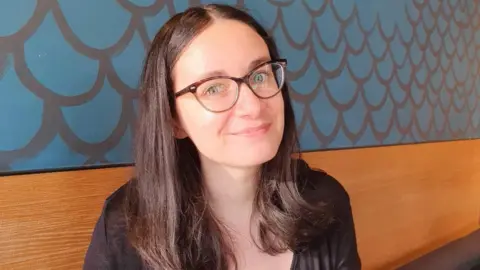 Nell
NellHat, who is from Weston-super-Mare and is now living in Exeter, is part of a campaign called Stop Oxevision.
Along with Sophina, 28, from the West Midlands, they have been contacted by dozens of others wanting to share their experiences.
"People have said that they've been afraid to sleep in their own beds," Hat said.
"They've been sleeping on the floor of the bathroom. They've been sleeping under a desk or out in communal areas - just because they're too afraid of the camera.
"For a lot of people when they are really unwell that can relate to fears or trauma around surveillance – whether that is paranoia or relates to past trauma, like sexual or domestic abuse."
Nell, 36, from Brighton, said her experience of camera surveillance was "dehumanising" and "isolating".
"It's a really understandable thing to assume that adding an extra level of surveillance would be safety, but it's really not. Nobody actually came into the room to engage with me."
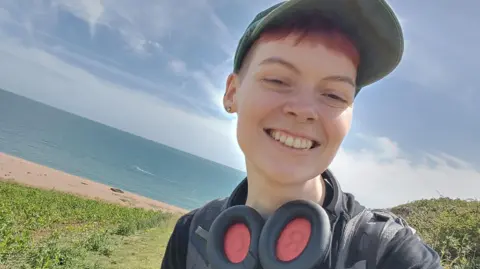 Hat
HatOxevision is now used in a number of mental health hospitals across England.
Infrared cameras monitor patients while they are in their bedrooms, and the technology is designed to measure a pulse, breathing rate and movement to confirm a patient is safe, meaning fewer one-to-one observations are needed.
Hospital staff are not viewing the footage all the time – but can see it for short periods and if a risk is detected, an alert will sound and staff can attend to the patient immediately.
But Hat said the campaign group has been told hospitals are not always obtaining consent from patients and their families, and believes the technology is not always being used correctly, impacting on their privacy.
"We've heard quite a lot of places where the monitors can be seen [from] out in the corridors and out in the garden, so there's nothing to stop other patients seeing that," they said.
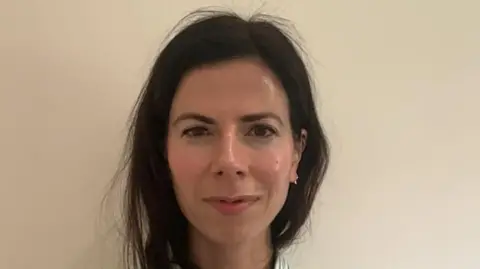
And Hat, Nell and Sophina are not alone in their concerns.
The ongoing Lampard inquiry into mental health deaths in Essex has also highlighted potential issues with the technology.
As part of its wider scope, it heard from Tammy Smith, the mother of Sophie Alderman, who believes Oxevision may have harmed her daughter's mental health before her death in 2022.
The inquiry was told Sophie, 27, "felt a deep discomfort around cameras", which triggered acute paranoia, believing she was under surveillance by the government.
Mrs Smith said she was "deeply concerned that the continual presence of an Oxevision camera in Sophie's room" would have therefore caused her "real and significant distress".
'Dehumanised'
Consultant clinical psychologist Dr Jay Watts has been a patient in a mental health hospital and called the use of Oxevision "a scandal".
"It is really playing on one of the worst things that can happen when we're unwell, feeling that we're being surveyed for someone else's gain rather than what matters most and what is necessary most for us," she said.
She said the technology was "attractive" to NHS managers because "it's a way to save money".
"Mental health is still very, very much the kind of pariah in terms of being underfunded and being under thought about, and really in terms of being dehumanised in a way that we don't find elsewhere," she added.
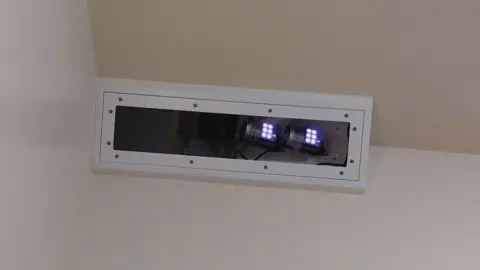
The Royal College of Psychiatrists and the mental health charity Rethink have also said they want to see the rollout of the technology paused.
"Video monitoring technology varies from CCTV to systems which electronically track vital signs and may have a positive role to play as part of this agenda," a Royal College of Psychiatrists spokesperson said.
"However, before any further rollout of video monitoring technology is considered, we believe there needs to be significant research undertaken that is independently accredited and co-produced with patients, their carers and families."
Rethink deputy chief executive Brian Dow said any form of surveillance must be done with "the explicit, clear and continued consent of patients... otherwise it risks doing more harm than good".
"We think the technology should be paused until we have that framework which guides the use and the application of those technologies because that is what I think will provide the comfort to patients, to families and professionals working in that setting," he added.
NHS England has said it has instructed mental health trusts to review its use of camera surveillance and will update its guidance in the coming months.
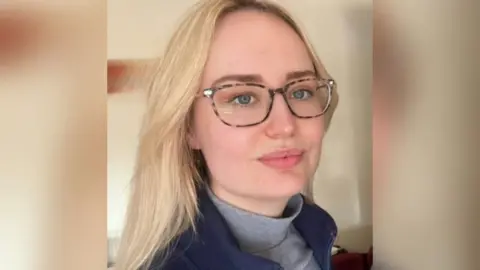 Sophina
SophinaIn response to the concerns, Oxehealth, which makes the technology, said: "The Oxevision platform, which features regulated medical device software, has been proven to help clinical teams enhance safety while providing therapeutic, personalised care to their patients.
"To support healthcare providers, national guidelines have been established to guide the implementation and effective use of the platform."
But for Hat, Nell and Sophina that doesn't go far enough.
"We totally understand the need to save money in the NHS but this absolutely isn't the way to do it," Hat said.
Follow BBC West on Facebook, X and Instagram. Send your story ideas to: [email protected] or via WhatsApp on 0800 313 4630.
